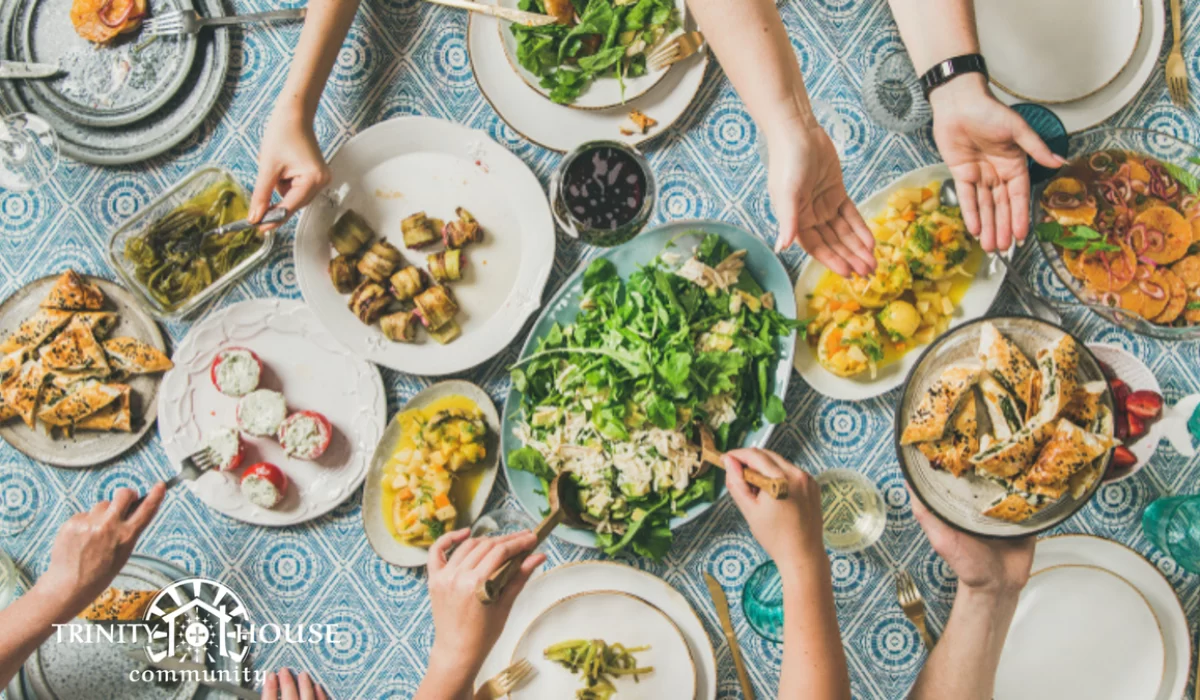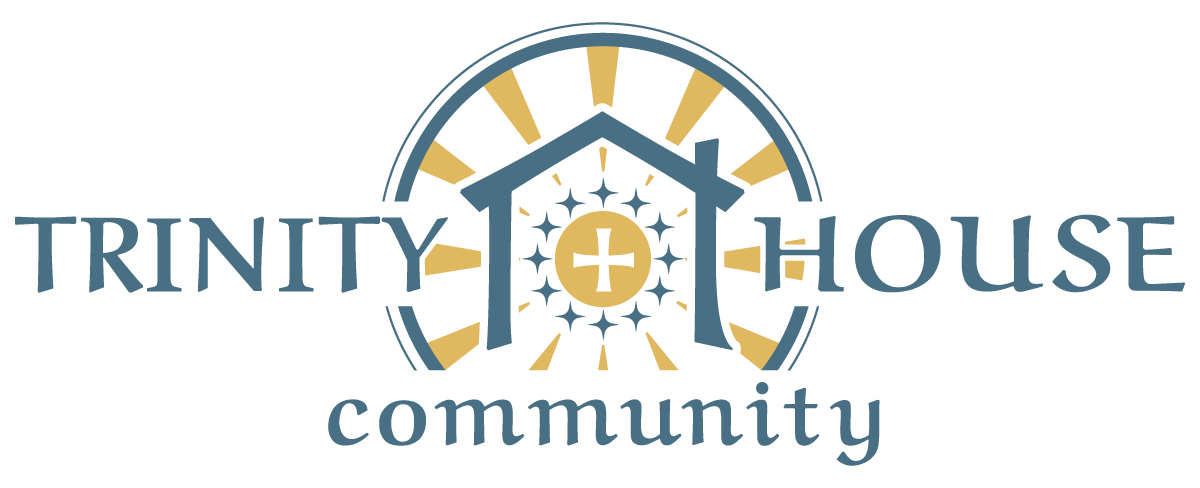

For this week’s Letter on Family Culture, Level 4 of your Trinity House, we are delighted to share our interview with Nick George. He’s a third-year clinical psychology doctoral student at Divine Mercy University, and he’s focusing his dissertation on the power of family meals. We hope you’ll learn as much as we did from him!
You’re working on a degree in clinical psychology. Of all the topics you could have chosen for your dissertation, why did you decide to hone in on the power of family meals?
I believe strongly in the power of the family to impact many important areas of healthy development for every family member. I also have a passion for cooking and preparing meals for my family and friends. As part of the clinical psychology doctoral program at Divine Mercy University, we have the wonderful opportunity to be able to make unique contributions to the psychology literature through our dissertation research. While we know that there is a wide range of psychosocial benefits for children when they eat frequent meals with their families, the impact of family meals on parents has not been thoughtfully explored. As a result, I was very excited for the opportunity to choose this topic for my project in order to help address this gap in the psychological literature.
What do you see as the top 2 or 3 benefits for families who have regular meals together?
Numerous psychological studies show that children and adolescents who have frequent meals with their families are more likely to flourish in many key areas. Whether that be a lower risk of obesity, depression, substance abuse, suicide, or sexual activity, the psychology literature has emphasized that frequent family meals tend to support healthy youth development. Additionally, the family meal acts as a natural time for parents and children to be able to strengthen their relationships and share their culture through food, stories, and traditions.
Families are so busy with extracurriculars and work. What would you say to a young family that is trying to establish a healthy rhythm of mealtimes?
I encourage young parents to find small ways to improve healthy mealtime routines with their children. Perhaps a starting point could be prioritizing one family meal together each week. This would involve everyone sitting down together to share a simple meal. While this sounds like it should be easy, I appreciate how challenging this can be with everyone’s work, school, activities, and other commitments. It may be that families need to schedule a standing mealtime on a particular day each week and then guard that time fiercely. Check in with each other after a few weeks and see how each other is feeling about them, and make adjustments to schedules and roles around meal preparation. Active engagement in the meals is crucial, and will go a long way toward helping establish virtuous habits for one’s family.
What are the top two or three obstacles you see preventing families from investing time together over family meals?
There is certainly no shortage of obstacles that are preventing families from having more frequent family meals with each other. As you would predict, one of the top barriers that has been found in recent literature is the task of coordinating parent and adolescent schedules amidst an increasingly busy world. Parents often work late, and teens frequently have after-school activities and extensive homework. Another barrier includes the misconception that family meals need to be “special” and that can feel overwhelming for food preparation, increase cost, and establish high expectations. The family meals we encourage are actually just everyday meals: simple foods, quick preparation and clean-up, and respectful of a family’s budget. Finally, an additional barrier can be that some families regularly watch television or have their cell phones at the table. The distraction of media and technology can have a significant negative impact on the nurturing of interpersonal relationships among family members during a meal.
The research is clear about how many benefits kids enjoy when their families have regular mealtimes. But can you share any insights into the kinds of outcomes that parents experience?
Given the abundance of literature that identifies just how beneficial frequent family meals are for children, one might expect that there is a similar level of research found for the parents as well. Surprisingly, the experience of parents around family meals has not been a focus of previous research. We have anecdotal evidence that parents generally associate having meals with their families with less stress and lower depression, but there are many layers yet to explore here. That is why I am so excited to begin my dissertation research and collaborate with Catholic parents to examine their experiences with family meals and how these experiences relate to their level of fulfillment in their vocation as a parent, and their general psychosocial well-being. I hope this will be the first of many more studies in this topic area!
Parents are their children’s primary teachers of the faith, their first evangelists and catechists. Can you share a few practical ideas for how parents can utilize the mealtime to strengthen their children’s faith?
One idea is for parents to have a Sunday brunch together after attending Mass in order to continue to celebrate the Lord’s Day and spend intentional time together. In addition, another idea for parents to consider is to find ways of incorporating the celebration of liturgical feast days into the family meals. Realistically, this could be something as simple as having a special dessert in order to celebrate and remember the life of a specific Saint. At the same time, the Church’s liturgical calendar also provides opportunities when the meal can be used to recognize the sacrifice of the Cross in one’s life by abstaining from certain mealtime routines, such as by not having meat or desserts.

> Not convinced of the lifelong impact your family dinner table will have on your children? Check out “The Benefits of the Family Table,” a summary of the social science data, courtesy of the American College of Pediatricians. |

> It’s not too late to subscribe and launch a Trinity House Community Group for families at your parish later this fall or early in 2024. Here are 3 options for you to consider:
1. Learn more here (en Español here). For just $499, your parish can access all the tools needed to host 5 transformative Gatherings for families in 2023-2024, including videos, discussion questions, marketing templates, catechetical resources, ongoing support, and more.
2. Book a 15-min. Demo Call at our calendar here (or here to speak with Elsy Marquez, our liaison to Spanish-speaking Groups).
3. Attend an upcoming Gathering and see for yourself! Here are just a few of the upcoming gatherings: Sat., Oct. 28th, at St. Philip in Falls Church (6:30 PM in Spanish); Sat., Nov. 11th, at St. John’s in Leesburg (6:30 PM; learn more here); and Sat., Nov. 18th, at St. Theresa’s in Ashburn (6:30 PM in the school cafeteria; more details here). Or contact us to hear about others coming up!
> For those in northern Virginia….Soren will give a Heaven in Your Home mini-workshop as part of St. Theresa Catholic School’s Partnering with Parents initiative this Thursday, October 26th, 9:15-10:30 AM in the St. Zelie Room. To reserve your spot, visit this page (free coffee AND free babysitting).

Trinity House Cafe is a special place. I’ve been to community meetings there, Bible studies, have met friends for spiritual counsel or deep discussion, have had lunch, dinner, coffee….I’ve been there to listen to music and to play music for others. Leesburg would be a poorer place without Trinity House Cafe.”
– Cafe Customer
Have a cafe story to share? Let us know here!




